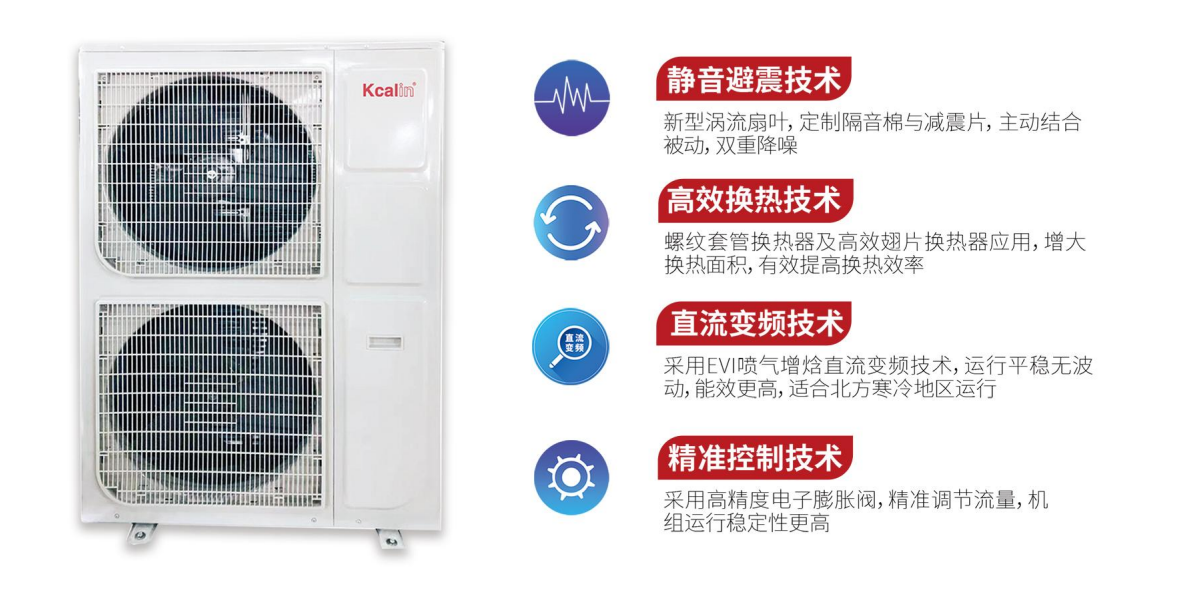With the advancement of technology and the increasing awareness of environmental protection, air source water heaters, as a new type of high-efficiency and energy-saving water heater, have gradually entered the vision of more and more families. Air source water heaters not only perform well in energy conservation, but also have multiple advantages such as environmental protection and safety. However, all products have their advantages and disadvantages, and air source water heaters are no exception.
Air source heat pump water heater, also known as air source heat pump water heater, works similarly to air conditioning by absorbing heat from the air to heat water. Specifically, the air source water heater absorbs heat from the air through the evaporator and transfers it to the refrigerant. The refrigerant is heated by the compressor and then transferred to the water in the water tank through the condenser, thereby achieving water heating. Due to the fact that air source water heaters mainly utilize the heat energy in the air, their energy efficiency ratio (COP) is usually above 3, which means that consuming 1 kilowatt of electricity can generate more than 3 kilowatts of heat energy.
The advantages of air source water heaters

Efficient and energy-saving: Air source water heaters have a high energy efficiency ratio, significantly reducing energy consumption. Compared to traditional electric water heaters, their energy consumption is only about one-third of that of electric water heaters, which means that using air source water heaters can reduce household electricity costs. In long-term use, the energy-saving effect is particularly significant, especially suitable for households with strict energy consumption requirements.
Environmental Protection: Air source water heaters utilize the heat energy in the air and do not require the combustion of fossil fuels, thus not producing harmful gas emissions such as carbon dioxide, and have good environmental performance. For environmentally conscious households, choosing an air source water heater is a practical action to contribute to reducing carbon emissions.
High safety: Air source water heaters do not have open flames or high-temperature electric heating elements during the heating process, avoiding the risks of fire and electric shock. In addition, its working temperature is lower, reducing the possibility of burns and making it safer to use. Especially for families with elderly and children, the safety advantages of air source water heaters are more prominent.
Long service life: The design life of air source water heaters is generally over 15 years, much higher than that of traditional electric water heaters. Its main components such as compressors have been professionally designed and manufactured, with high reliability and durability, reducing the trouble and cost of frequent equipment replacement.
Stable hot water supply: Air source water heaters have a large water tank storage capacity, which can provide stable hot water supply. Especially during peak water usage periods, such as in the morning and evening, air source water heaters can ensure that all family members can enjoy sufficient hot water and improve their quality of life.
Disadvantages of air source water heaters
High initial investment: The purchase cost of air source water heaters is relatively high, and the initial investment is higher than that of traditional electric and gas water heaters. For families with limited budgets, this may be a significant burden. However, it should be noted that although the initial investment is relatively high, its long-term energy-saving effect can gradually offset the initial investment.
Affected by environmental temperature: The working efficiency of air source water heaters is greatly affected by environmental temperature. In low temperature environments (such as winter), there is less heat in the air, and the energy efficiency of air source water heaters may decrease, which may require longer time to heat water and affect the user experience. To solve this problem, some air source water heaters have been designed with low-temperature compensation function, but its effect is still inferior to its performance in warm environments.
As an efficient, energy-saving, environmentally friendly and safe new type of water heater, air source water heater has multiple advantages, especially suitable for households with environmental awareness and energy conservation. However, its disadvantages such as high initial investment, large installation space requirements, and susceptibility to environmental temperature also need to be considered.







Comment